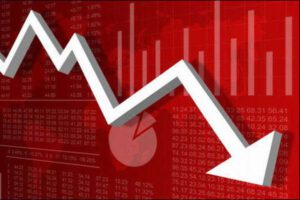
Estimates of the likelihood of a recession in the US economy have risen sharply amid high inflation and rising interest rates in the US, according to a regular poll by The Wall Street Journal.
Respondents estimated the probability of a recession in the US in the next 12 months at 63% against 49% in July. The indicator exceeded 50% for the first time since July 2020. The WSJ data since 2005 show that experts’ assessment of the chances of a recession at this level in rare cases did not correspond to a real recession.
The survey was conducted October 7-11 among 66 economists.
On average, respondents forecast a 0.2% annualized decline in US GDP in the first quarter of 2023 and a 0.1% decline in the second quarter. The July forecast called for growth of 0.8% and 1%, respectively.
Companies will respond to the shrinking economy and their profits by firing employees, experts say. According to them, the number of jobs in the US with the exception of the agricultural sector will decrease by an average of 34 thousand per month in the second quarter of next year and by 38 thousand in the third quarter. Previously, it was expected that in these six months the number of jobs will grow by an average of 65 thousand monthly.
Economists are increasingly skeptical about the Federal Reserve’s ability to keep raising rates to slow inflation without triggering a rise in unemployment and a recession. About 59% of analysts polled fear that the Fed will raise rates too high from 46% in July.
“A soft landing will most likely remain a fairy tale that will never come true,” said Daniil Manenkov, an economist at the University of Michigan.
“The negative impact from rising rates and a stronger dollar is huge and will cost about 2.5 percentage points of GDP growth next year,” said Aneta Markowska, senior economist at Jefferies LLC. “.
At the same time, the recession will be relatively short, experts believe. Those economists who estimate the probability of a recession higher than 50% generally believe that it will last 8 months. The average duration of US recessions after World War II is 10.2 months.
In 2023 as a whole, the United States economy will grow by 0.4%, in 2024 – by 1.8%, according to the consensus forecast. Economists expect growth of 0.2% this year.
Unemployment in the United States, according to the average forecast of experts polled by the WSJ, will increase from September 3.5% to 3.7% by the end of 2022, then reach 4.3% by July and 4.7% by December next year, after which it will hold around this level throughout 2024.
“The Fed is choosing the lesser of two evils – a recession and rising unemployment now or the risk of more destructive and persistently high inflation in the future,” said KPMG’s Diane Swank. “The risk of error is very high.”
The Fed raised the key interest rate by 75 basis points in the last three meetings, and now the rate is 3-3.25%. September inflation in the United States beat forecasts at 8.2%, which almost certainly means that the Fed will raise rates again in November by 75 bp.
By the end of this year, the rate will rise to 4.267%, according to the consensus forecast of economists polled by the WSJ, and the peak value of 4.551% will reach next June. At the same time, about 30% of respondents believe that the Fed will start cutting rates as early as the fourth quarter of 2023, and 28% expect a reduction in the first quarter of 2024.

The energy crisis and inflation are creating serious problems for restaurants and hotels in Germany, to reduce increased costs, entrepreneurs are introducing additional fees for electricity and heating, according to Redaktions Netzwerk Deutschland (RND).
“Rising energy costs are making it difficult for the hospitality industry. Some hotels expect to spend an additional €200,000 on heat and electricity every year. To cover these costs, more hotels and restaurants are introducing a flat energy rate of €3.9 per night. This is intended to offset at least some of the extra costs.
As the portal notes, one of these hotels is the five-star Bareiss in Bairsbronn in Baden-Württemberg. From September, the hotel charges 9 euros more per person per night, and also reserves the right to raise the rate further.
According to hoteliers, accommodations are heavily dependent on gas and electricity, so energy costs are rising exponentially. In addition, the business began to spend more on the salaries of employees.
In turn, at The Hearts Hotel boutique hotel in the Braunlage resort in Lower Saxony, each guest currently pays an additional 3 euros per day for electricity.
According to forecasts by the chairman of the German Association of Hotels and Restaurants (Dehoga) Axel Strehl, a similar problem will affect about 10% of accommodation in Germany.
According to RND, a similar situation is developing in restaurants in Germany. So, each visitor to the Zum Grünen Hof restaurant near Bremen must pay an additional 1.5 euros. At the same time, according to the owner, the visitors supported the businessman and are ready to pay even more if it helps to keep the establishment running.

A new law will come into force in Turkey on January 1, 2023, according to which a tax will be charged on accommodation in hotels, guest houses and other tourist accommodation facilities, TGRT Haber TV channel reports.
“The effect of this law was postponed two years ago, however, on the eve of its entry into force in January 2023, the tax administration prepared a draft communiqué containing the details of the document. So, from January 1, in hotels, motels, guest houses, holiday villages, boarding houses, apart-hotels , thermal resorts, campsites will be charged a fee of 2% of the cost of all services. The President of Turkey will have the right to reduce or increase the tax rate within these limits,” writes the portal.
It is noted that the mechanism for levying the tax has not yet been determined. Organized tourists will probably pay for it when buying a tour, and independent travelers will pay when checking out from a hotel. Also, the tax may be levied on the hoteliers themselves, their family members and partners who use accommodation and recreation services for free. Staff working and living on site will not pay the fee.
“The services offered in the accommodation facility, which are sold together with the overnight stay, are subject to the accommodation tax. This includes food, drinks, activities, entertainment services and the use of swimming pools, sports, thermal and similar areas offered in the hotel, as well as all concepts – BB , HB, FB, all inclusive, ultra all inclusive, writes TGRT Haber.
As the portal clarifies, for services provided outside the accommodation facility, for example, transfers, excursions, escorts, a separate invoice is issued without tax.
If the rate is calculated in a foreign currency, it will be converted into Turkish Lira at the rate of the Central Bank of Turkey in force on the date of the taxable event, i.e. the day the stay at the hotel ends, to determine the amount of the fee.

Crown Prince of Saudi Arabia Mohammed bin Salman bin Abdulaziz announced the allocation of humanitarian aid to Ukraine in the amount of $400 million, the official SPA news agency reported on Saturday following his phone talk with President of Ukraine Volodymyr Zelensky the day before.
The Crown Prince emphasized “the Kingdom’s position of supporting everything that will contribute to de-escalation, and the Kingdom’s readiness to continue the efforts of mediation,” SPA reported.
In turn, Zelensky congratulated the crown prince for his appointment as the Prime Minister of the Kingdom, and expressed his thanks and appreciation to the Kingdom for its vote for the UNGA resolution, along with 142 other countries, condemning Russia’s decision to annex.
Ben Salman stressed that the Kingdom’s vote for the resolution emanates from its commitment to the deep rooted principles in the UN charter and international law, and its commitment to the respect of state sovereignty and the principles of good neighborliness, and resolving conflicts by peaceful means.
The President of Ukraine said the two leaders had agreed to work towards the release of Ukrainian prisoners of war held by Russian troops. The Saudi Crown Prince played a prominent role in mediating efforts in September that successfully led to the release of 10 prisoners of war, including two Americans.

The US dollar is getting cheaper against the euro and the pound sterling at the auctions on Monday, it is stable against the yen.
The ICE-calculated index, which shows the dynamics of the dollar against six currencies (the euro, the Swiss franc, the yen, the Canadian dollar, the pound sterling and the Swedish krona), is losing 0.29%, the broader WSJ Dollar Index – 0.27%.
The euro/dollar is trading at $0.9750 compared to $0.9722 at the market close on Friday.
The rate of the American currency against the yen is 148.72 yen against 148.75 yen following the results of the previous session.
The pound rose to $1.1272 from $1.1183. On Friday, British Prime Minister Liz Truss fired Chancellor of the Exchequer Quasi Kwarteng, appointing Jeremy Hunt to the post.
According to the Financial Times, several British Conservative MPs and prominent figures from the City of London are calling for Truss herself to step down as prime minister after controversial economic decisions that undermined her credibility.
Britain’s new finance minister told the BBC last Sunday, speaking of the possibility of winding down any of the government’s recent stimulus measures, that “nothing is out of the question.”
Later on Monday, Hunt intends to make a statement regarding the country’s medium-term budget.
The dollar rose against the yuan during trading to 7.1996 yuan from 7.1910 yuan at market close on Friday. Chinese President Xi Jinping, speaking at the 20th Congress of the Chinese Communist Party (CCP), which opened on Sunday, signaled that the country’s authorities would continue their tough policy to contain the spread of COVID-19, which has already seriously weakened the country’s economy this year.

Oil prices rise on Monday after a significant fall on Friday and following the results of the entire past week.
Market fears associated with a possible decrease in demand for energy resources in the world remain, and this factor is likely to continue to put pressure on the oil market, Bloomberg notes.
Chinese President Xi Jinping, speaking at the 20th Congress of the Chinese Communist Party (CCP), which opened on Sunday, signaled that the country’s authorities would continue their tough policy to contain the spread of COVID-19, which has already seriously weakened the country’s economy this year.
The cost of December futures for Brent crude on the London ICE Futures exchange by 8:10 pm on Monday is $92.31 per barrel, which is $0.68 (0.74%) higher than the closing price of the previous session. As a result of trading on Friday, these contracts fell by $2.94 (3.1%) to $91.63 per barrel.
The price of futures for WTI oil for November in electronic trading on the New York Mercantile Exchange (NYMEX) rose by this time by $0.62 (0.72%), to $86.23 per barrel. By the close of previous trading, the value of these contracts fell by $3.5 (3.9%) to $85.61 per barrel.
As a result of last week, Brent fell by 6.4%, WTI – by 7.6%.
“The momentum we see today is likely to be short-lived as there is no clear reason for a rally,” said Vanda Insights founder Vandana Hari. “Investors may now be seeing profitable opportunities in the market after last week’s sharp drop.”